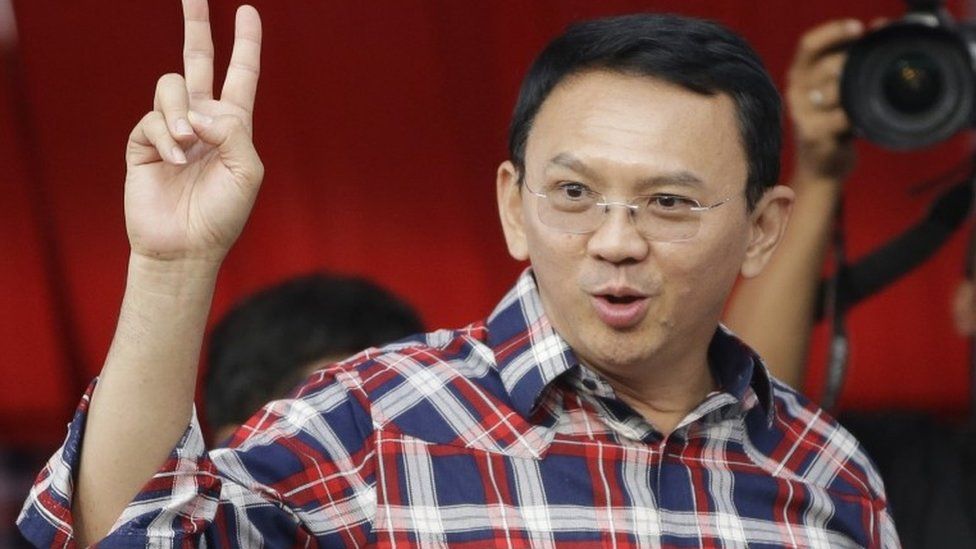Jakarta election: What is with 'Ahok's' checked shirts?
- Published

With a sea of young people in checked shirts before him, Jakarta's governor might have been mistaken for a rock star in another country. But the hipsters' favourite clothing item has become a political symbol in the capital of Indonesia, as the BBC's Simeon Paterson explains.
Clothes have long communicated more than just comfort or class in Indonesia, a vast and diverse nation with a mix of languages, cultures and religions. So it is perhaps unsurprising that politicians have also turned to sartorial branding to distinguish themselves.
Political plaid began in 2012 in Jakarta when Joko Widodo, known as Jokowi, (with the microphone), successfully ran for governor with running mate Basuki Tjahaja Purnama.
The shirts gave the reformist pair a more informal, hardworking look than the batik shirts often worn by traditional politicians. It is also said to have appealed to trendy young voters - a huge electoral force in Indonesia.
When Jokowi became president in 2014, Mr Purnama, popularly known as Ahok, took over the governorship and a similar political wardrobe.
The shirt has featured prominently in his campaign for governorship elections, taking place on 15 February.
He typically wears it with the sleeves rolled up, as though he is about to get to work, which does nothing to diminish his reputation as a hands-on governor, not afraid to get out of the office and take charge when officials are not up to the job.
The look has been adopted by his supporters, who turn up at rallies in versions of the shirt.
But candidates and running mates co-ordinating their look is common in Indonesia.
One of Mr Purnama's main rivals for the Agus Harimurti Yudhoyono (left), a candidate for the Jakarta governorship and son of a former president, and his deputy Sylviana Murni, routinely wear black.
Candidate Anies Baswedan (right) and his running mate Sandiaga Uno prefer white shirts, here combined with traditional songkok hats.
Both items are conservative symbols, usually worn by devout Muslims, a demographic Mr Baswedan has courted during campaigning.
The choices are insignificant in an election that has been overshadowed by religious social tensions.
Mr Purnama is ethnically Chinese and a Christian, the first non-Muslim to hold the governor's post in 50 years.
He is currently on trial for blasphemy, after telling voters that religious leaders who said the Koran told them not to vote for a non-Muslim leader were misleading them.
Huge protests, led by hardline Islamists, have demanded he be punished, some even calling for his execution, while leaders have urged Muslims to choose one of the Muslim candidate.
The role of Jakarta governor is often seen a springboard to the presidency, so the election is being closely watched across the country.
Voters will find out later this month whether they will have a city leader clad in black, white or hipster checks.
- Published15 February 2017
- Published14 February 2017
- Published9 May 2017